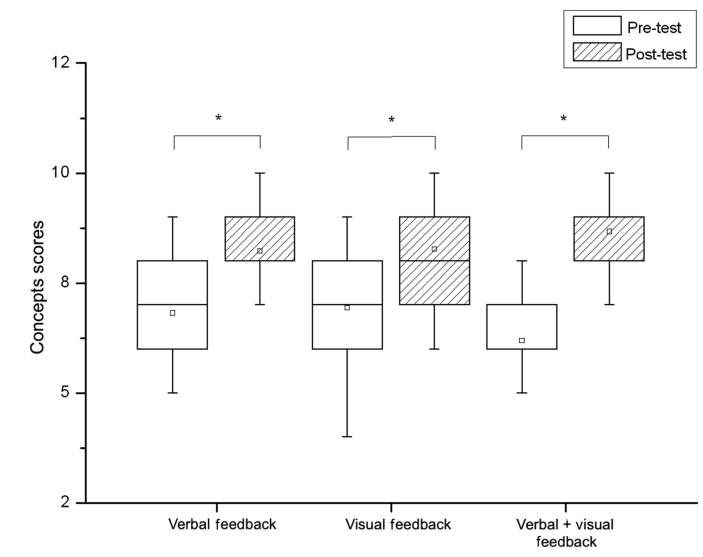Life-Cycle Forces
Balance
(Comparing static balance to dynamic balance)
Which concept was demonstrated by the "What is 8X8?" demo in class?
In middle childhood, reading comprehension improves. What was one of the reasons given for this?
Working memory capacity increases
Children acquire more general knowledge of their world
Children use more appropriate reading strategies than they used to
Children monitor their comprehension better than they used to
What is one of the ways that people develop a sense of worth through work according to lecture?
Developing and becoming oneself
Creating union with others
Expressing oneself
Providing service to others
What's wrong with this graph?

The y-axes are presented in a misleading way.
Which lobe of the brain is the latest to fully develop and is most associated with decision-making, planning, and self-control?
The frontal lobe
Note. The pre-frontal cortex typically does not fully develop until approximately 25 years of age.
"The developing person is embedded in a series of interacting systems" is the main idea of which of the categories of theories on human development?
Ecological and Systems Theories
(e.g., Bronfenbrenner's Theory of Development)
Motor Development
Physical Development
Affective Development
Cognitive Development
How would a Vygotskyian theorist describe the skills, knowledge, and concepts that the learner is close to acquiring but cannot yet master without help?
Naive biological concepts like understanding the difference between animate and inanimate objects are characteristic of which of the stages of cognitive development discussed in the lifespan approach lecture?
Cognitive Development in Early Childhood
"Investigative," "Conventional," and "Realistic," are all personality types proposed by which theory?
Holland's Theory of Occupational Choice
What was the primary takeaway from López-Ferrer et al. (2022)?
The combination of verbal and visual feedback produces greater improvements in conceptual learning of the aspects to be developed during the reception of the volleyball, higher values in the self-perception of the students about their motor performance, and greater enjoyment, relative to verbal feedback or visual feedback individually.
Which famous psychological experiment from the 1960s had participants believe that they were delivering painful electric shocks to another person?
Stanley Milgram's Obedience Experiment

Which psychologist is most famously associated with behaviorism and learning?
B.F. Skinner

What is the difference between qualitative and quantitative data?
Qualitative data is non-numerical, descriptive data that captures qualities, characteristics, or meanings.
Quantitative data is numerical information that can be measured and expressed in numbers.
A child is 5 years old and is clearly exhibiting egocentrism in their thinking. According to Piaget's Stages of Cognitive Development, in which stage would this child be?
Preoperational Stage
(2-7 Years Old)
In adolescence, information processing speed increases and adolescents develop better metacognitive skills. What is the third concept that was mentioned as a developing factor in adolescence from a lifespan perspective on cognitive development?
Reasoning about moral issues
(Typically advancing through the conventional stages of Kolberg's stages of moral development)
Who tends to participate in a greater range of leisure activities: Young adults or middle-aged adults?
Young adults
What was the primary takeaway from Becker et al. (2018)?
There may be a curvilinear relation between sport intensity and executive functions such that executive functions may be differentially, and curvilinearly, related to the amount of intensity exhibited in sporting activities by 3rd-graders.
According to the exercise-aging cycle, as people age, heart disease, fat levels, and anxiety tend to increase with age. What is one thing that tends to decrease?
Physical Activity
Exercise
Physical Abilities
Strength
Energy
Self-Esteem
Also including Erik Erikson's Psychosocial Theory of Human Development, which perspective on human development was championed originally by Sigmund Freud?
The Psychodynamic Perspective on Human Development
The idea that development has a "goal" is exemplary of which of the six elements of developmental change?
Developmental change is directional
What is the main argument of Siegler's Overlapping Waves theory?
Children do not rely on a single way of thinking at a given stage as Piaget suggested; rather, they use multiple strategies at the same time (like overlapping waves).
By approximately what age, according to lecture, have most children learned the addition tables well enough that sums of single-digit integers are simply retrieved from memory?
8 to 9 Years Old
Within the framework of the lecture on occupational development, what is alienation?
When workers feel that what they are doing is meaningless and that their efforts are devalued, or when they do not see the connection between what they do and the final product.
What is the relation between a sample and a population?
A sample is the specific participants in a research study (e.g., 30 College of Wooster students); whereas a population is the researcher's broader grouping of interest from which the sample is pulled (e.g., all college students).
When was the last time a team from Ohio defeated the Ohio State Buckeyes in football, and who was the team?
Oberlin College defeated OSU by a score of 7-6
Each of the different perspectives on human development have different opinions on nature-nurture, continuity, and universal principles. Which category of theories put the strongest emphasis on nature in the nature-nurture debate?
Cognitive Theories (e.g., Piaget)
What is the term for the capacity to undertake the physical tasks of daily life with success and with a given level of ease?
Physiological Functional Capacity
Note. This capacity tends to decrease in older adulthood.Which theory of cognitive development emphasizes that children are "little detectives" and they construct hypotheses to explain everything they see and hear?
Theory-Theory of Cognitive Development
According to the lecture on a lifespan perspective on cognitive development, when do older adults struggle the most when it comes to information processing?
When they must direct their own attention instead of being instructed on where they should direct their focus.
What are the five stages of Super's Theory of Occupational Development?
1. Implementation
2. Establishment
3. Maintenance
4. Deceleration
5. Retirement
What is the difference between a hypothesis and a research question, and how are they related?
Research questions represent the underlying points of investigation that drive research projects. For example, how is feedback related to accuracy on math problems?
Hypotheses are specific, testable, predictions. For example, "We predict that students in the feedback group will be more accurate on the posttest math problems than participants in the no-feedback group."
What is the name of the manual most commonly used by psychological clinicians in the United States to classify mental disorders, and which edition is most current?
The DSM-V-TR
Diagnostic and Statistical Manual of Mental Disorders
Fifth Edition, Text Revision (Published in 2022; 5th edition published in 2013).